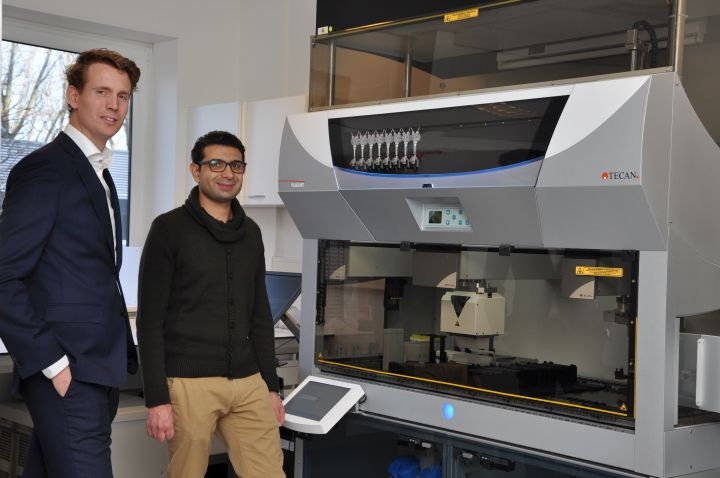Keywords:
Detecting adverse off-target effects is crucial to ensure the safety of potential therapeutics, but limited throughput and ethical considerations have traditionally forced pharmaceutical companies to perform safety pharmacology studies at a late stage of the drug development process. Human stem cell-based cellular models and automated screening processes are revolutionizing drug safety studies, enabling much earlier testing, with companies such as Ncardia at the forefront of this workflow transformation.
Safety pharmacology is an important part of the drug discovery process, identifying and investigating any potential undesirable pharmacological effects of candidate drugs before they enter clinical development. These effects are often hard to characterize in cellular or simple in vivo models, requiring animal testing – usually in canine models – to ensure the potential therapeutic is safe to proceed to the next phase. The cost and ethical issues associated with such testing mean that safety pharmacology studies have traditionally been performed at a late stage of preclinical development. This can lead to late-stage failure of candidate drugs, resulting in significant financial losses.
Avoiding these expensive failures is a major goal for pharmaceutical companies, creating a real need for new technologies – such as organ-ona- chip approaches – that enable drug safety studies to be performed far earlier in the development process. Ncardia is a pioneer in this area, developing and commercializing highly predictive cellular assay systems derived from human stem cells to accurately assess drug safety. Dr Stefan Braam, Co-founder and CEO of Ncardia, explained: “Our aim is to put ‘human’ testing at the forefront of drug discovery, by developing the best possible human cellular models. This is very attractive from an industry perspective, as it ensures only viable candidate drugs are progressed through the pipeline, while avoiding the risks and ethical considerations associated with animal testing. Our expertise in the manipulation and differentiation of stem cells into cardiac cell lines allows us to create a synchronously beating layer of human cardiomyocytes in culture. In combination with predictive safety tests – such as multi-electrode arrays – these cells provide a convenient and costeffective cardiac model, allowing safety studies to be performed much earlier in the overall process. Our technology has already been adopted by many of the world’s top 20 pharmaceutical companies, demonstrating the huge potential of this approach.”

Stefan Braam (left) and Farbod Famili with Ncardia’s Fluent Automation Workstation
Assay development is at the forefront of Ncardia’s offering, and the company is actively involved in the design and validation of assays intended for day-to-day use by pharmaceutical and biotechnology companies. Stefan continued: “Safety pharmacology is just one potential application of humanderived cellular models, and we are also interested in using this technology to enable high throughput drug efficacy testing. By culturing cardiomyocytes in a 384-well microplate format, we can provide our customers with the tools to screen tens of thousands of potential drug molecules in a human model. This ensures more reliable and accurate screening data, reducing the risk of throwing out the baby with the bath water.”
Farbod Famili, Assay Development Scientist at Ncardia’s Leiden facility in the Netherlands, took up the story: “Pharmaceutical companies understandably demand assays that are robust and reliable, and compatible with high throughput automated screening platforms. When I first arrived at Ncardia, almost all of our processes were performed manually, which worked when handling a limited number of compounds for safety pharmacology studies using multi-well, multi-electrode array chips, but was not compatible with high throughput efficacy testing applications. We therefore wanted to automate the entire cell culturing process, performing each step as quickly as possible to avoid variations across a microplate. We looked at the various liquid handling solutions on the market, and were impressed by both the speed and flexibility of the Fluent® Automation Workstation. With three independent arms, it offered us the potential to significantly accelerate the process, while still being a very versatile platform. We had already had a positive experience working with Tecan when we purchased a Spark® microplate reader, and so we were confident in both the service and support the company offers.”
"We had already had a positive experience working with Tecan… so we were confident in both the service and support the company offers."
“The system was installed at the beginning of summer 2017, and has everything required to culture and differentiate stem cells integrated into it, including an automation-friendly incubator and a laminar flow HEPA hood to ensure sterility. We knew that setting up such a complex workflow for highly sensitive cells would be challenging, and finding the optimal labware and workdeck configuration was the first obstacle, but the 3D simulator in FluentControl™ makes it very easy to visualize your protocols, speeding up process development. It also gives you the option to define everything – labware, protocol availability, dispense volumes, etc. – for inexperienced operators, which makes it much easier for everyone in the lab to use the system once it is in routine use. Working in 384-well microplates, we’re currently handling 40 plates in a single run. This would take at least five times as long to do manually, so the benefits are felt immediately.”
For more information on Tecan’s drug discovery portfolio, visit www.tecan.com/drugdiscovery
To learn more about Ncardia, go to www.ncardia.com
Keywords:









